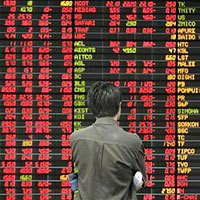Surviving Financial Nuclear Winter
By Roger Ehrenberg

Everyone has an opinion, yet nobody knows anything about what the future holds for the U.S. economy, the global economy and the true depth of the impact of the financial markets crisis. We all know that what happens on Wall Street eventually hits the real economy, and the data bear this out - rapidly rising jobless claims, weaker consumer sentiment, poor business sentiment, sharply lower housing prices, etc.
And higher levels of unemployment, coupled with falling real asset prices, means that consumption, by definition, must fall. Falling consumption will hurt most companies, durables companies worse than non-durables, luxury retailers worse than supermarket chains and health care providers, etc. And none of this says anything about the consumers' access to credit, which will likely be crimped for the foreseeable future. What this means for stock prices, and whether enough bad news is already reflected in current stock prices, is up for debate.
The question many are asking, is: Should we buy either single stocks or the broad market now, because the recent plunge has made certain companies and/or market indices cheap? And my response is: For most people, this is the wrong question. Because if there is one thing I do know, nobody can predict the future.
To survive what could be a multi-year recession, a nuclear winter of sorts, people at all levels of the wealth spectrum need to get the big things right. And what, exactly, are those things?
- Liquidity: Do you have at least a few years' worth of ready cash, in case the job is lost or prices of key household items unexpectedly skyrocket?
- Volatility: Can you live with your financial profile, understanding that the worst of the economic downturn might still lie ahead?
- Stability: Do you have expenses coming up in the intermediate term that could materially impact your financial picture, should the recession last longer than anyone expects, e.g., tuition expenses, new car, loan amortization payments, etc.?
If you are very wealthy, very liquid and have mad money to trade, then go for it. Otherwise, don't take a view on the current environment. Notwithstanding TARP, the new plans to buy commercial paper from issuers, and the actions taken by European leaders to prop up their ailing financial sector, we could be in for several years of weak economic conditions, as the excesses of the first eight years of this decade are painfully unwound.
Click here to read the full text of the article
Subscribe to Pravda.Ru Telegram channel, Facebook, RSS!





